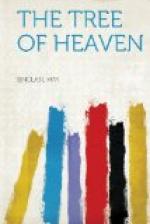“I’m simply trying to tell you what war is. It’s dirt and stink and funk. That’s all it is. And there’s precious little glory in it, Nicky.”
“If the Boers won there would be glory,” Michael said.
“Not even if the Boers won,” said Maurice.
“Certainly not if the Boers won,” said Anthony.
“You’ll say next there’d be no glory if there was war between England and Ireland and the Irish won. And yet there would be glory.”
“Would there? Go and read history and don’t talk rot.”
“I have read it,” said Michael.
Frances thought: “He doesn’t know what he’s talking about. Why should he? He’s barely thirteen. I can’t think where he gets these ideas from. But he’ll grow out of them.”
It was not Maurice that she saw in Maurice’s war-pictures. But he had made them realize what war was; and they vowed that as long as they lived not one of their sons should have anything to do with it.
* * * * *
In the spring of nineteen-one Anthony sent Maurice out to California. The Boer War was ended.
Another year, and the vision of war passed from Frances as if it had never been.
IX
Michael was unhappy.
The almond trees flowered in front of the white houses in the strange white streets.
White squares, white terraces, white crescents; at the turn of the roads the startling beauty of the trees covered with pink blossoms, hot against the hot white walls.
After the pink blossoms, green leaves and a strange white heat everywhere. You went, from pavements burning white, down long avenues grey-white under the shadows of the limes.
A great Promenade going down like a long green tunnel, from the big white Hotel at the top to the High Street at the bottom of the basin where the very dregs of the heat sank and thickened.
Promenade forbidden for no earthly reason that Michael could see, except that it was beautiful. Hotel where his father gave him dinner on his last day of blessed life, telling him to choose what he liked best, as the condemned criminal chooses his last meal on the day they hang him.
Cleeve Hill and Battledown and Birdlip, and the long rampart of Leckhampton, a thin, curling bristle of small trees on the edge of it; forms that made an everlasting pattern on his mind; forms that haunted him at night and tempted and tormented him all day. Memory which it would have been better for him if he had not had, of the raking open country over the top, of broad white light and luminous blue shadows, of white roads switchbacking through the sheep pastures; fields of bright yellow mustard in flower on the lower hills; then, rectangular fir plantations and copses of slender beech trees in the hollows. Somewhere, far-off, the Severn, faint and still, like a river in a dream.




